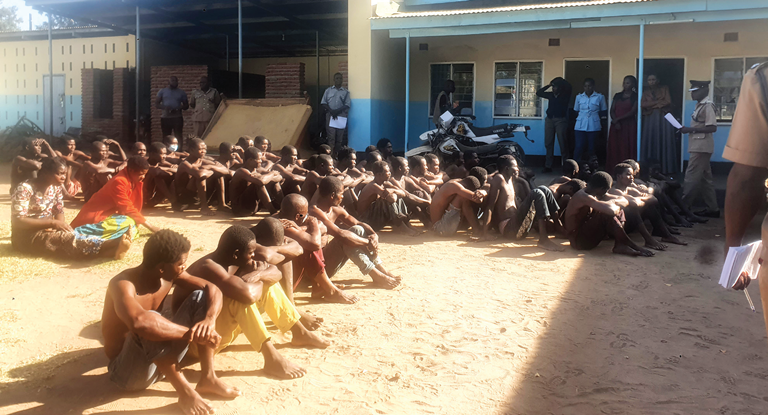Justice for the forgotten
Daniel Liyaya Gama, a kabaza bicycle taxi operator from Mtambalala Village in Kasungu, spent five months at Kasungu Prison after losing a colleague’s bike.
“Several times, police took me to court, but my case was never heard as they kept changing the dates,” laments the father of five.

After five months without trial, Gama was released by an in-prison court supported by Paralegal Advisory Service Institute (Pasi) under the Chilungamo project funded by European Union (EU) and the United Nations Development Programme (UNDP).
The cyclist feels relieved to finally return to his family.
He opened up: “It pains to be punished for a crime I didn’t commit.
“Prison is a harsh place. I developed some sores in my thighs because of extreme heat and overcrowding. In the congested cells, it’s easy to catch tuberculosis and skin diseases.”
As part of the access to justice programme, paralegals list down suspects unfairly kept in detention. They include those who have overstayed in prison, are held unlawfully or cannot afford bail conditions set by the courts.
The paralegal officers discuss the list with the prosecuting authorities prior to the camp courts.
Peace talks
Salion Kalumikiza spent about seven days in a prison cell for allegedly vandalising his neighbour’s house in Mgaya Village, Traditional Authority (T/A) Kambwiri in Salima.
“Apart from visiting me, the paralegals were also investigating my case in the village where they found no evidence against me,” he recalls.
Later, Kalumikiza’s accuser confessed just implicating him.
“He requested my release so that we could handle the matter with village mediators,” he explains.
During the mediation talks held shortly after his release, Kalumikiza forgave his accuser.
The village mediators tackle petty cases diverted by the police and the courts. This enhances access to justice for the poor, reducing overcrowding in prisons and police cells.
T/A Maganga says the diversion of minor cases to community mediators guarantees peace and justice.
“Village mediators are helping restore peace between conflicting parties,” says the traditional leader.
Decongesting prison
Unlike Gama and Kalumikiza, some detainees are stuck in prison because they cannot afford lawyers.
The paralegals from Pasi constantly visit prison and police cells to screen pre-trial cases.
Kasungu first grade magistrate Damiano Banda is pleased that camp courts and cell visits are decongesting detention facilities.
“Most cells in the country are small. When they were built, the population and crime rate was lower. Now most prison and police cells are congested. These processes help to decongest the cells because some cases are concluded faster,” he explains.
Legal Aid Bureau director Masauko Chamkakala says the camp courts enable magistrates to hear several cases at once.
He explains: “Getting court dates is a serious problem for people already in prisons.
“So, to have a day where we can process more than 10 people is always good. It ensures that those people have a day in court in the most efficient way.”
But Biar Kamanga, another first grade magistrate in Kasungu, advises the police to exercise their lawful powers to grant bails at no cost instead of leaving it only to the courts.
He states: “We observe that bail is seldom granted to most of the accused persons because of communities’ perceptions that police only give bail when they receive something in return.”
The law empowers the most senior police officer to grant bail or unconditional release where there is no evidence to charge the suspect.
Homicide courts
Last December, Pasi and its partners embarked on decongestion strategies targeting murder suspects as well as convicts awaiting the High Court to confirm their sentences. About 373 homicide remandees in various prisons have been released through this initiative.
“Suspects charged with homicide usually face lengthy delays before standing trial,” says Pasi national programmes coordinator Chimwemwe Ndalahoma.
The cases mostly pile due to resource constraints, communication breakdowns and poor coordination in the criminal justice system.
The homicide camp courts target confined suspects who have stayed over 90 days without trial contrary to Section 161 of the Criminal Procedure and Evidence Code. The paralegals follow up on stagnant bail application and resubmit bail applications denied by the High Court.
Inspector Tanazio Lipenga, in charge of remands at Maula Prison, says the correctional facilities require urgent decongestion measures.
He explains: “Currently, 304 of the 1 155 remandees are homicide suspects.
“The camp courts will help to bring the numbers down.”






One Comment